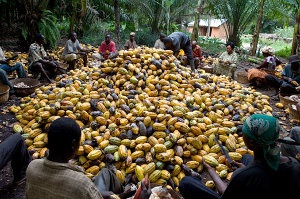- Home - News
- TWI News | TV
- Polls
- Year In Review
- News Archive
- Crime & Punishment
- Politics
- Regional
- Editorial
- Health
- Ghanaians Abroad
- Tabloid
- Africa
- Religion
- Election 2020
- Coronavirus
- News Videos | TV
- Photo Archives
- News Headlines
- Press Release
Business News of Thursday, 18 April 2013
Source: B&FT
Cocoa producers act to curb pest invasion
Farmers and stakeholders in West Africa’s cocoa-producing countries must work effectively to prevent the invasion of exogenous pests and pathogens, as this can have dire impacts on cocoa production, says Afriyie Haffer, board-member of Ghana Cocoa Board (COCOBOD).
“Cocoa is the backbone of most economies in the sub-region and, therefore, we cannot afford to open the industry to exogenous invasion. There is need to adhere to measures being implemented by industry regulators to eliminate pests and pathogens that hinder high cocoa productivity,” she said in Accra at the official opening of a five-day regional workshop on integrated management of cocoa pests and pathogens.
She said Government is committed to improving cocoa production in the country, stressing support for projects that will tackle the issue of pests and pathogens in the cocoa sector in order to boost cocoa productivity and improve the lives of cocoa farmers.
Under the theme “Controlling Indigenous Pests and Diseases and Preventing the Introduction of Exogenous Ones”, the workshop seeks to raise awareness on the incidence, severity and damage caused by indigenous cocoa pests and the threats that would be posed by an invasion of exogenous ones from other continents into Africa.
It is also expected to launch a project in five participating countries -- Ghana, Côte d’Ivoire, Cameroon, Togo and Nigeria -- to address the problem of exogenous invasion and to agree on implementation procedures, protocols for assessing cocoa production losses due to pests and diseases; and also share experiences with experts from global industry players on measures needed to prevent the spread of exogenous pathogens into Africa.
The project will be implemented by COCOBOD with support from the International Cocoa Organisation (ICCO) and the Common Fund for Commodities (CFC). About 40 percent of global annual cocoa production is lost to insect pests and diseases, which usually follow a regional pattern of distribution and are indigenous to specific geographic areas.
In the current global market, the movement of humans and commodities pose a risk of introducing exogenous pests and pathogens to new regions and continents. Mr. Tony Fofie, Chief Executive Officer, COCOBOD, explained the significance of the exercise: “Management of pests and pathogens costs the cocoa sector a lot of money and, in most cases, is fraught with the use of fake chemicals by some farmers.
“This workshop will address some of these challenges, including getting farmers to use correct and approved pesticides, and collaborating with security agencies to guard against the introduction of exogenous cocoa pests and pathogens into the country. “The cocoa industry provides sustenance to farmers in the various cocoa-producing countries, so the need for integrated management of such pests and pathogens cannot be downplayed. As a major producer, we must have concern for sustainability and quality control.”
With a production of about 2.7 million tonnes of cocoa beans per year on average, Africa holds approximately 70 percent of world cocoa production, and even more in terms of world exports. From this volume of production, Ghana, Nigeria, Cameroon, Côte d’Ivoire and Togo represent about 98 percent of cocoa output in Africa.











